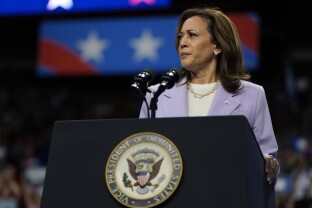Labor groups sighed with relief — and basked in their newfound prominence as a voting bloc — after Kamala Harris called for ending subminimum wages for tipped workers this week. It was a win on top of both candidates’ proposals to end taxes on tips.
But they got snubbed on the debate stage Tuesday.
“I was disappointed that the moderators didn’t bring up No Tax on Tips since it’s on both campaigns’ platforms, and it’s gotten so much press,” Saru Jayaraman, president of One Fair Wage, texted NOTUS after the debate. “It didn’t feel to us like [Harris] had the opportunity to raise it given how quickly they moved on from this key issue.”
Before the debate, she said the candidates’ shared promise to end taxes on tips has highlighted tipped workers in a new way.
“You see the presidential campaigns vying for this workforce’s vote in a way that we have never, ever, ever, ever seen before,” she told NOTUS.
Trump backed ending taxes on tips before Harris, a position many restaurant owners have supported. When Harris came out in favor of the same proposal, some in the labor movement expressed fear that she might diverge from Biden’s pro-union agenda and move in a more pro-business direction.
Ironically, she received flak from both Trump and pro-labor activists for backing the no taxes on tips proposal this summer. Trump said she was parroting his platform, and labor leaders said it barely scratched the surface of workers’ economic concerns.
The only time the Democratic Party platform has addressed subminimum wages for tipped workers was in 2016. In its 2020 and 2024 platforms, ending subminimum wages was mentioned in the context of disability rights but not specifically about tipped workers. Harris included the end of subminimum wages for both people with disabilities and tipped workers in her latest set of proposals.
On the campaign trail, almost exactly four years ago, then-presidential candidate Joe Biden announced on X he would also “End the tipped minimum wage,” but his efforts stalled in Congress.
There are about 4 million tipped workers in the country, making up just 2.5% of the workforce, according to Ernie Tedeschi, the former chief economist in the Biden White House and current director of Yale University’s Budget Lab. Ending taxes on tips serves as more of a messaging role, he said.
“I think that tipped occupations are one of the main ways that we interact with the service economy, so it sort of looms large in our imagination as an occupation,” Tedeschi told NOTUS. “It’s really not a big part of the labor force.”
He theorized that Trump’s proposal was a new tax idea meant to appeal to voters in a specific swing state with a large number of tipped workers: Nevada.
The state has already banned subminimum wages for tipped workers, so no taxes on tips would add a new benefit. For other swing state voters, Harris’ additional promise of ending the subminimum wage has a much higher immediate cash-in-hand benefit.
On a federal level, both proposals face a divided Congress and an emboldened judicial branch.
But even before these issues reach Washington, they’ll be playing out on the campaign trail, where some labor leaders think they could make the difference in November.
“We think in Nevada, the economic argument is going to turn this election,” Culinary Union Local 226 leader Ted Pappageorge of Nevada said. He added that in other swing states like Pennsylvania, ending the subminimum wage for tipped workers would help “people put food on the table, pay for their kids, health care and pay the rent right now.”
—
Claire Heddles is a NOTUS reporter and an Allbritton Journalism Institute fellow.
Sign in
Log into your free account with your email. Don’t have one?
Check your email for a one-time code.
We sent a 4-digit code to . Enter the pin to confirm your account.
New code will be available in 1:00
Let’s try this again.
We encountered an error with the passcode sent to . Please reenter your email.


